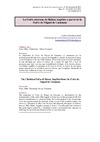Identificador persistente para citar o vincular este elemento:
https://accedacris.ulpgc.es/jspui/handle/10553/73483
| Campo DC | Valor | idioma |
|---|---|---|
| dc.contributor.author | Alemán Alemán, Lorena Del Pino | en_US |
| dc.date.accessioned | 2020-06-25T13:15:39Z | - |
| dc.date.available | 2020-06-25T13:15:39Z | - |
| dc.date.issued | 2019 | en_US |
| dc.identifier.issn | 2013-6986 | en_US |
| dc.identifier.other | WoS | - |
| dc.identifier.uri | https://accedacris.ulpgc.es/handle/10553/73483 | - |
| dc.description.abstract | La adaptación de Fedrade Miguel de Unamuno se caracteriza por la modernización del mito de la tragedia de Eurípides y, además presenta por primera vez la formalización de una Fedra cristiana. El autor proyecta en ella los preceptos de una ideología que marca el carácter de la mujer del siglo XX y sirve de precursor para otras versiones que desmitificarán la figura de la heroína clásica. Así, Halma Angélico nos presenta en La nieta de Fedrasu versión de esta figura griega marcada por un moralista entorno cristiano que la reprime, plasmando el carácter más realista de la mujer de su tiempo. | en_US |
| dc.description.abstract | The adaptation of Fedra by Miguel de Unamuno is characterized by the modernization of the myth of the tragedy of Euripides and also presents for the first time the formalization of a christian Fedra. The author projects in her the precepts of an ideology that marks the character of the woman of the twentieth century and serves as a precursor to other versions that will demystify the figure of classical heroine. Thus, Halma Angelica presents in Fedra's Granddaughter her version of this greek figure marked by a moralistic christian environment that represses it, reflecting the most realistic character of the woman of his time. | en_US |
| dc.language | spa | en_US |
| dc.relation.ispartof | Anagnorisis-Revista De Investigacion Teatral | en_US |
| dc.source | Anagnorisis-Revista De Investigacion Teatral [ISSN 2013-6986], n. 20, p. 101-125, (Diciembre 2019) | en_US |
| dc.subject | 62 Ciencias de las artes y las letras | en_US |
| dc.subject | 620310 Teatro | en_US |
| dc.subject.other | Fedra | en_US |
| dc.subject.other | Mito | en_US |
| dc.subject.other | Cristianismo | en_US |
| dc.subject.other | Halma | en_US |
| dc.subject.other | Unamuno | en_US |
| dc.subject.other | Mith | en_US |
| dc.subject.other | Christianity | en_US |
| dc.title | La Fedra cristiana de Halma Angélico a partir de la Fedra de Miguel de Unamuno | en_US |
| dc.title.alternative | The Christian Fedra of Halma Angelico from the Fedra by Miguel de Unamuno | en_US |
| dc.type | info:eu-repo/semantics/Article | en_US |
| dc.type | Article | en_US |
| dc.identifier.isi | 000506397300006 | - |
| dc.description.lastpage | 125 | en_US |
| dc.identifier.issue | 20 | - |
| dc.description.firstpage | 101 | en_US |
| dc.investigacion | Artes y Humanidades | en_US |
| dc.type2 | Artículo | en_US |
| dc.contributor.daisngid | 9047551 | - |
| dc.description.observaciones | Alumna de postgrado (3er. Ciclo) de la Universidad de Las Palmas de Gran Canaria | en_US |
| dc.description.numberofpages | 25 | en_US |
| dc.utils.revision | Sí | en_US |
| dc.contributor.wosstandard | WOS:Aleman, LA | - |
| dc.date.coverdate | Diciembre 2019 | en_US |
| dc.identifier.ulpgc | Sí | en_US |
| dc.contributor.buulpgc | BU-HUM | en_US |
| dc.description.esci | ESCI | |
| dc.description.dialnetimpact | 0,0 | |
| dc.description.dialnetq | Q3 | |
| dc.description.dialnetd | D7 | |
| dc.description.erihplus | ERIH PLUS | |
| item.fulltext | Con texto completo | - |
| item.grantfulltext | open | - |
| crisitem.author.orcid | 0000-0002-4949-5775 | - |
| crisitem.author.fullName | Alemán Alemán, Lorena Del Pino | - |
| Colección: | Artículos | |
Visitas
196
actualizado el 23-nov-2024
Descargas
35
actualizado el 23-nov-2024
Google ScholarTM
Verifica
Comparte
Exporta metadatos
Los elementos en ULPGC accedaCRIS están protegidos por derechos de autor con todos los derechos reservados, a menos que se indique lo contrario.
